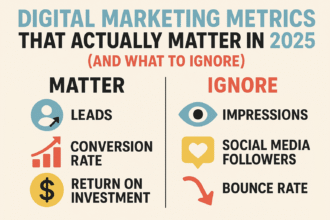Artificial intelligence is no longer just a futuristic concept—it’s a driving force behind how businesses attract, engage, and retain customers today. From automating tedious tasks to delivering hyper-personalized campaigns, AI marketing tools have quickly evolved from “nice-to-have” add-ons into mission-critical assets for staying competitive.
In fact, a Salesforce survey revealed that 60% of marketers already use AI to improve efficiency and customer experience, while Gartner predicts that AI-driven platforms will manage over 40% of marketing tasks by 2025. Whether you’re a solopreneur, a small business owner, or part of a global brand, adopting the right AI tools now can mean the difference between leading the market—or falling behind.
In this guide, we’ll explore the AI marketing tools you should be using right now across different areas of digital marketing: content creation, SEO, social media, email marketing, customer insights, and analytics.
Why AI Marketing Tools Are Essential in 2025
Before diving into the tools, it’s worth asking: why are AI marketing platforms so powerful—and why now?
- Speed and efficiency – AI can automate repetitive tasks like keyword research, content scheduling, and A/B testing in seconds.
- Personalization at scale – Machine learning allows brands to deliver customized recommendations and messaging to millions of users simultaneously.
- Data-driven decision making – Instead of relying on guesswork, AI tools analyze enormous datasets to identify trends, patterns, and opportunities.
- Cost-effectiveness – By reducing manual work, AI marketing software frees up resources to focus on strategy and creativity.
Simply put: in a digital landscape that changes daily, AI gives marketers the agility and insight they need to stay ahead of competitors.
AI Content Creation Tools
Content remains the backbone of digital marketing—but creating high-quality, SEO-optimized material consistently is tough. That’s where AI comes in.
1. Jasper AI
Jasper AI is one of the most popular AI copywriting tools. It helps create blog posts, ad copy, product descriptions, and even long-form guides. With templates optimized for conversion and tone adjustment features, Jasper allows marketers to generate content tailored to brand voice.
- Best for: Long-form blog posts, ad copy, and social media content.
- Standout feature: Boss Mode for generating structured long-form content.
2. Copy.ai
If you need quick, punchy copy for social posts, product launches, or email subject lines, Copy.ai is an excellent choice. Its intuitive interface makes it accessible for marketers who need fast content generation without complex setups.
- Best for: Short-form content and brainstorming ideas.
- Standout feature: AI-powered idea generation.
3. Writesonic
Writesonic combines AI writing with an SEO optimization layer, making it a strong tool for creating blog posts that rank. It integrates directly with SurferSEO, allowing writers to optimize articles as they go.
- Best for: SEO-focused content marketing.
- Standout feature: Built-in AI image generator for paired visuals.
AI SEO Tools
Ranking on Google remains a top priority, and AI SEO tools help streamline the process from keyword research to technical optimization.
4. SurferSEO
SurferSEO analyzes top-ranking content and provides actionable insights for optimizing your articles in real-time. It considers keyword density, structure, and backlinks to help your content stand out.
- Best for: On-page SEO optimization.
- Standout feature: Real-time content editor with ranking factors.
5. Clearscope
Clearscope focuses on semantic SEO by analyzing search intent and recommending related terms to boost relevance. Many top brands use it to improve organic search visibility.
- Best for: Content relevance and depth.
- Standout feature: Semantic keyword suggestions for better ranking.
6. SEMrush AI Features
SEMrush has integrated AI tools for keyword clustering, topic research, and predictive analytics, making it a full-suite platform for digital marketing teams.
- Best for: Comprehensive SEO campaigns.
- Standout feature: AI-driven keyword clustering.
AI Tools for Social Media Marketing
Social platforms thrive on real-time engagement, and AI tools are transforming how brands connect with their audiences.
7. Lately.ai
Lately.ai repurposes long-form content (like blogs or podcasts) into multiple social posts, helping businesses maintain a consistent online presence.
- Best for: Content repurposing.
- Standout feature: AI-generated captions tailored to brand tone.
8. Predis.ai
Predis.ai generates carousels, reels, and posts in seconds. It even suggests trending hashtags and designs, making it a go-to tool for small teams.
- Best for: Instagram and TikTok marketing.
- Standout feature: Instant post creation from a single prompt.
9. Sprout Social (AI Integrations)
Sprout Social’s AI-enhanced scheduling and engagement tools provide predictive posting times and automated sentiment analysis, ensuring brands interact meaningfully with audiences.
- Best for: Social analytics and management.
- Standout feature: AI-driven engagement recommendations.
AI Tools for Email Marketing
Email remains one of the highest-ROI channels, and AI tools make campaigns more personalized and impactful.
10. Seventh Sense
Seventh Sense optimizes email send times for each subscriber, increasing open rates and engagement.
- Best for: Send-time optimization.
- Standout feature: AI learning based on subscriber behavior.
11. Phrasee
Phrasee uses natural language generation to craft subject lines and body text that maximize clicks. Its predictive models help identify what resonates with specific audiences.
- Best for: Optimizing subject lines and CTAs.
- Standout feature: AI-powered language personalization.
12. Mailchimp (AI Features)
Mailchimp now integrates AI features like predictive segmentation, content recommendations, and smart send-time optimization, making it more powerful than ever.
- Best for: SMB email campaigns.
- Standout feature: Predictive audience segmentation.
AI Customer Insights & Analytics Tools
To truly stay ahead, brands must understand not just what customers do—but why they do it.
13. Crayon
Crayon uses AI to monitor competitors’ digital footprints, offering deep insights into market shifts, pricing strategies, and messaging.
- Best for: Competitive intelligence.
- Standout feature: Real-time competitor tracking.
14. PaveAI
PaveAI turns raw Google Analytics data into actionable marketing reports with AI-driven recommendations.
- Best for: Simplifying analytics.
- Standout feature: AI-powered decision reports.
15. Gong.io
Originally designed for sales teams, Gong uses AI to analyze customer conversations, uncovering insights that also guide marketing campaigns.
- Best for: Conversation-driven insights.
- Standout feature: AI-powered customer sentiment analysis.
How to Choose the Right AI Marketing Tools
With so many options available, how do you pick the tools that truly move the needle? Here are a few guiding principles:
- Align with goals – Choose tools that match your marketing priorities (SEO, lead generation, engagement, etc.).
- Ease of integration – Look for platforms that connect with your existing CRM, CMS, and analytics systems.
- Scalability – Pick solutions that grow with your business rather than short-term fixes.
- Cost vs. ROI – Evaluate how much time, money, and opportunity the tool saves compared to its cost.
Key Takeaways
- AI marketing tools are essential for staying ahead in 2025, helping businesses automate, personalize, and scale campaigns.
- Content creation platforms like Jasper, Copy.ai, and Writesonic streamline writing tasks.
- SEO tools like SurferSEO, Clearscope, and SEMrush drive visibility and traffic.
- Social media AI tools such as Lately.ai and Predis.ai make engagement effortless.
- Email marketing is elevated with tools like Seventh Sense and Phrasee.
- Analytics platforms like Crayon and PaveAI turn data into actionable insights.
- The right tool depends on your business size, industry, and goals—but adopting AI now is no longer optional.








